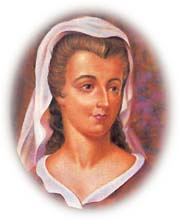A Mother Who Made A Difference!
With deep admiration, Samuel Wesley wrote this to his children: "You know what you owe to one of the best of mothers . . . above all (for) the wholesome and sweet motherly advice and counsel which she has often given you to fear God . . . "
Susanna Wesley lived just long enough to see the fruits of her work; two months before she died in July 1742, her son John preached a series of revival messages in their home town of Epworth, England, to the biggest crowds that area had ever seen. The blossoming ministry of John and Charles would impact generations to come for the Gospel of Christ.
Yet their success was a blessing Susanna was not sure God would let her enjoy in this life; mingled with her happiness were some hurtful memories. In nineteen years, she gave birth to nineteen children, nine of whom died as infants—including two sets of twins. One baby was accidentally smothered by a maid. Another was crippled for life in a tragic accident.
Susanna met her trials with the faith in God that she had learned as a child. She was the youngest of twenty-five, born in 1669 to the family of Dr. Samuel Annesley, a well-known, powerful minister.
Her parents were gracious, tireless workers who kept a pleasant home. Her father's study was a hub of intellectual activity where many famous men of the day debated on current issues. Always keeping an attentive ear to the arguments was young Susanna, who loved to learn. She had an opportunity for education available to few women of her time, and she made the most of it. Her bright mind absorbed her father's instruction.
Susanna remembered those days with fondness, especially her growth in the Lord. She wrote in a letter: "I will tell you what rule I observed when I was young, and too much addicted to childish diversions—never to spend more time in mere recreation in one day than I spent in private religious devotions." She was as pretty and captivating on the outside as she was in her heart, and the young Samuel Wesley was quick to notice. They wed on November 11, 1688, when Susanna was nineteen. But when she married him, she did not anticipate the tough life ahead.
The first battle was a material one. Because Samuel was a newly ordained minister in the Church of England, he had to wait for appointments to parishes that paid a sufficient salary. Eventually, he was made a rector at Epworth, a good position, but by then they were mired in debt. To make the situation worse, Samuel was a poor money manager. Every side venture he touched turned to disaster and left them poorer than before. Between bearing children and enduring lingering sicknesses, Susanna was unable to do much to supplement his income. The generosity of friends and supporters kept them going during the bleakest periods.
Despite his love for her and his commitment to Christ, Samuel was blind to his faults. At times he was tyrannical and despotic at home. Once after a minor disagreement, he abandoned Susanna and their several children for an entire year. No matter what the circumstances, however, Susanna was committed to caring for her family the best way possible. Though resources were limited, she started a daily school for her children. She said her purpose was exclusively "the saving of their souls," so the rigorous academics never took priority over instruction in God's Word. Each day before class, she set aside an hour to herself for Scripture reading and prayer, and then led them all in singing psalms.
Biographer Arnold Dallimore notes: "Susanna trained her children to obey and in so doing richly molded their characters." Each child had separate responsibilities, a necessity in running a large household. When one was disruptive, Susanna responded with appropriate discipline. Though some modern counselors are critical of Susanna's methods, their assessment of her is accurate. She never disciplined excessively or unkindly. Because Susanna wanted to develop a personal relationship with each child, she scheduled a private appointment with each of them once a week for encouragement. These bonds of faith and love helped them survive continual hardships.
Twice their home was destroyed by fire, and God saved them from the flames. In the second fire, John was only five and was trapped upstairs. Neither Susanna nor Samuel could reach him, but they heard his cries of fear. They prayed, and John appeared in the window just in time to be grabbed before the roof caved in.
Shortly before she died at age seventy-three, Susanna wrote Charles to describe her faith. She admitted that for years she struggled with doubt and confusion about her salvation, but that she finally had complete peace. "When I had forgotten God, yet I then found He had not forgotten me. Even then He did by His Spirit apply the merits of the great atonement to my soul, by telling me that Christ died for me."
With her family gathered around her bedside during her final illness, she said: "Children, as soon as I am released, sing a psalm of praise to God." Her grace marker reads in part: ". . . A Christian here her flesh laid down, the cross exchanging for a crown."
GBYAY


<< Home